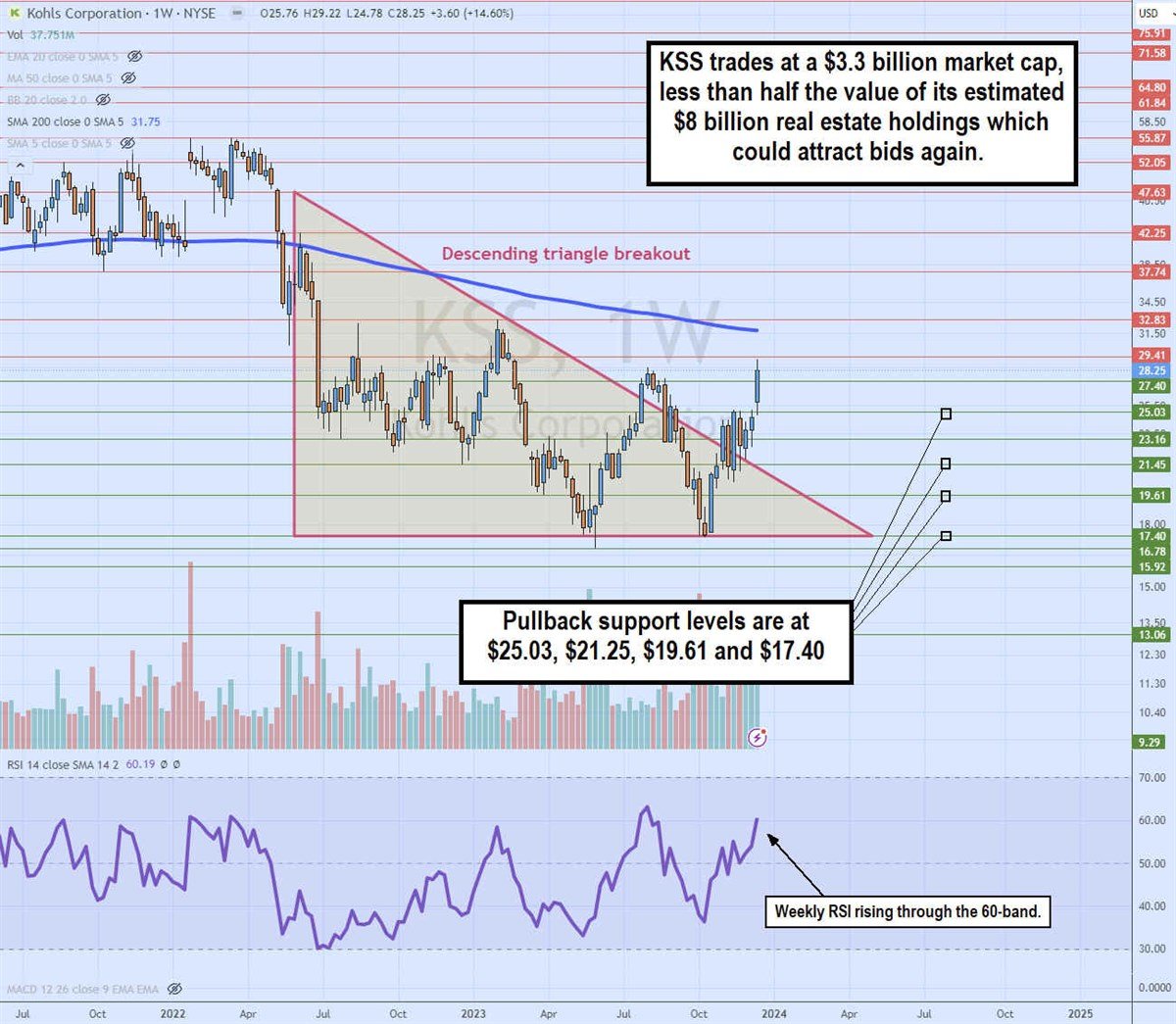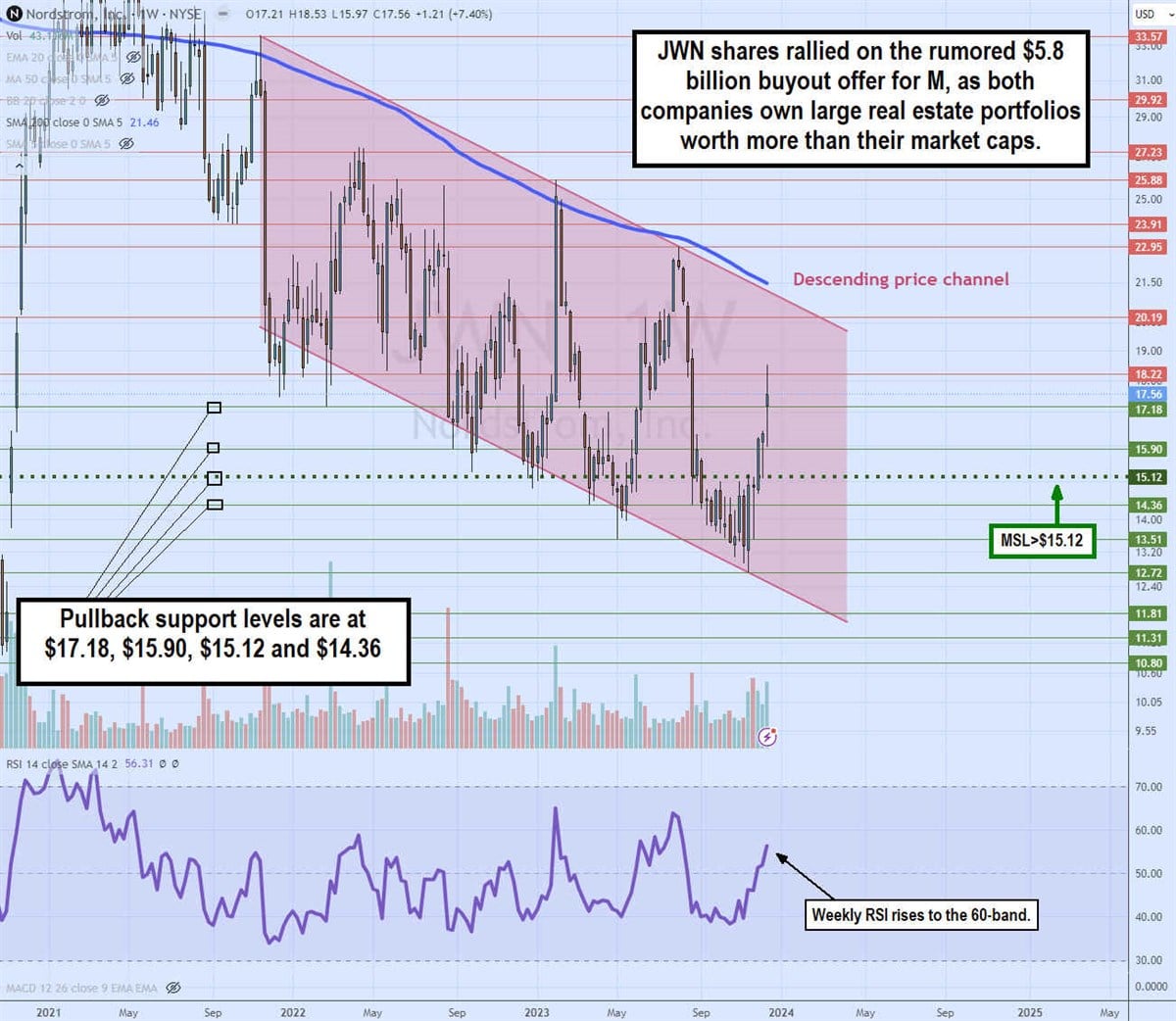
The investor-led $5.8 billion bid for the acquisition of Macy's Inc. (NYSE: M) sent the company's shares soaring over 20%. Retailer stocks in the consumer discretionary sector spiked as well. While nothing has developed from the rumor, the market continues to keep shares elevated, perhaps due to being undervalued for so long.
Even with a $5.8 billion offer, it's significantly below the estimated $11 billion of real estate Macy's owns. A sales-leaseback deal makes sense in this scenario. That would allow a buyer to acquire the retailer and lease back the property to collect income while the retailer beefs up its cash position and pays down debt. Here are two retailers to watch as potential takeover targets.
Kohl's Co. (NYSE: KSS)
Investors can't forget the period of takeover speculation in shares of department store operator Kohl's in 2022. The rumors sent shares rocketing into the mid-$50s. Kohl's owns the real estate for over 400 stores, with an estimated value exceeding $8 billion. The company received a takeover offer from Sycamore Partners at $65 per share in January 2022, which valued the company at $9 billion. Management rejected the offer, stating that it undervalued the company.
The bidding race commences
This started the bidding process as more bidders made confidential offers, and the company confirmed it had received multiple offers in March 2022. In June 2022, The Franchise Group Inc. (NYSE: FRG) made an offer of $64 per share. This caused a race to the bottom as Sycamore lowered its bid to $61 per share, which Franchise Group countered with a $60 bid.
Race to the bottom
The Franchise Group had made a final offer at $53, which included financing the deal by selling some of Kohl's real estate. The two parties entered three weeks of exclusive negotiations that eventually fell through in June 2022.
Post-COVID normalization and failure to pivot crush valuation
At this point, the post-COVID hangover kicked in as normalization took down elevated stock prices and valuations as demand dropped from high inflation and weakening consumer sentiment. This resulted in rising inventories and promotions, both squeezing gross margins. Ultimately, Kohl's shares collapsed to a low of $17.68 in October 2023. While the company was spot-on, focusing on athleisure and casual apparel during the pandemic, it failed to pivot back. It doubled down on leisure wear during the post-COVID recovery as consumers returned to the office. This caused shares to crater as its CEO, Michelle Gass, resigned to join Levi Strauss & Co. (NASDAQ: LEVI) on December 2, 2022. Check out the sector heatmap on MarketBeat.
Normalization concluding and inventories fall 13%
The painful normalization appears to be in the rearview mirror as the rate of decline in sales has slowed to 5.2% YoY in Q3 2023. Kohl's has returned to profitability, reporting EPS of 53 cents in the quarter, beating analyst estimates by 18 cents. While comparable sales fell 5.5%, inventories shrunk by 13%. This is what the market was waiting to hear. The company gave in-line guidance for full-year 2023 with EPS between $2.30 to $2.70 versus $2.41, according to consensus analyst estimates. Full-year 2023 sales are expected to decrease from 2.8% to 4%.
Spark in a kerosene-soaked warehouse
Kohl's stock has also started to recover, but the market cap remains around $3.3 billion, well below the value of its real estate holdings. With a forward P/E of 11.3, a 7% annual dividend yield and a large 25.4% short interest, like a spark in a kerosene-soaked warehouse, shares could squeeze on any potential takeover speculation.
Kohl's analyst ratings and price targets are at MarketBeat. Kohl's peers and competitor stocks can be found with the MarketBeat stock screener.

Weekly descending triangle breakout
The weekly candlestick chart on KSS illustrates the breakout from the descending triangle pattern. The descending trendline commenced in May 2023 at $47.63 as shares made lower highs on the bounce attempts—the flat-bottom trendline formed at $17.40. The weekly market structure low (MSL) breakout formed on the $20.95 trigger, pushing shares through the descending trendline in November 2023. KSS continued to accelerate its breakout in December as it approached the weekly 200-period moving average resistance at $31.75. The weekly relative strength index (RSI) is rising through the 60-band. Pullback support levels are at $25.03, $21.25, $19.61 and $17.40.
Nordstroms Inc. (NYSE: JWN)
Like Macy's, Nordstrom also owns a large real estate portfolio. Nordstrom owns about a third of its retail department stores, meaning most are leased. However, the estimated valuation of its 33 full-time department stores (out of 110 total) could be around $5 billion. Considering Nordstrom's market cap is just over half the real estate value at $2.85 billion. Shares of Nordstrom also soared on the rumor of Macy's bid.
Nordstrom privatization attempts
In 2017, rumors swirled about the Nordstrom family's intent to privatize the company, but negotiations with the board went nowhere, citing financing issues. In 2019, the family attempted to take the company private again, this time offering $50 per share, but it was rejected by the Board of Directors, who deemed it inadequate. The Nordstrom family is estimated to own a 15% to 20% stake in the company. The Nordstrom family has significant control of the operations, with Erik Nordstrom at the helm as CEO and Pete Nordstrom as the President. Rumors swirled again in 2023 about the family's potential interest in taking the company private, but nothing materialized.
Normalization narrows
Nordstrom reported an EPS of 25 cents in Q3 2023, beating consensus analyst estimates by 13 cents. Revenues fell 6.4% YoY to $3.32 billion, falling short of analyst estimates of $3.41 billion. The GMV fell 7.1% YoY. Nordstrom banner net sales fell 9.4%, and GMV fell 9.8%. Nordstrom Rack banner net sales fell 1.8% YoY. The company guided full-year 2023 EPS of $1.90 to $2.10 versus consensus estimates of $2.01. Revenues are expected to fall 4% to 6% YoY, equating to $14.60 billion to $14.91 billion versus $14.69 billion analyst estimates.
CEO Erik Nordstrom commented, "In the third quarter, we continued to make progress against our priorities, and we're especially pleased with the resulting improvements in gross margin and earnings. Given continued uncertainty and softening consumer spending, we're remaining agile and focused on serving our customers."
Nordstrom analyst ratings and price targets are at MarketBeat.

Weekly descending triangle
The weekly candlestick chart on JWN illustrates a descending price channel, which commenced at $33.57 in November 2021. JWN continued to form lower highs and lower lows, eventually hitting a swing low of $12.72 in Nov. 2023. The weekly MSL triggered on the breakout through $15.12, sending shares up through $18.00 as the weekly RSI climbs toward the 60-band. Pullback support levels are at $17.18, $15.90, $15.12 weekly MSL trigger and $14.36.













